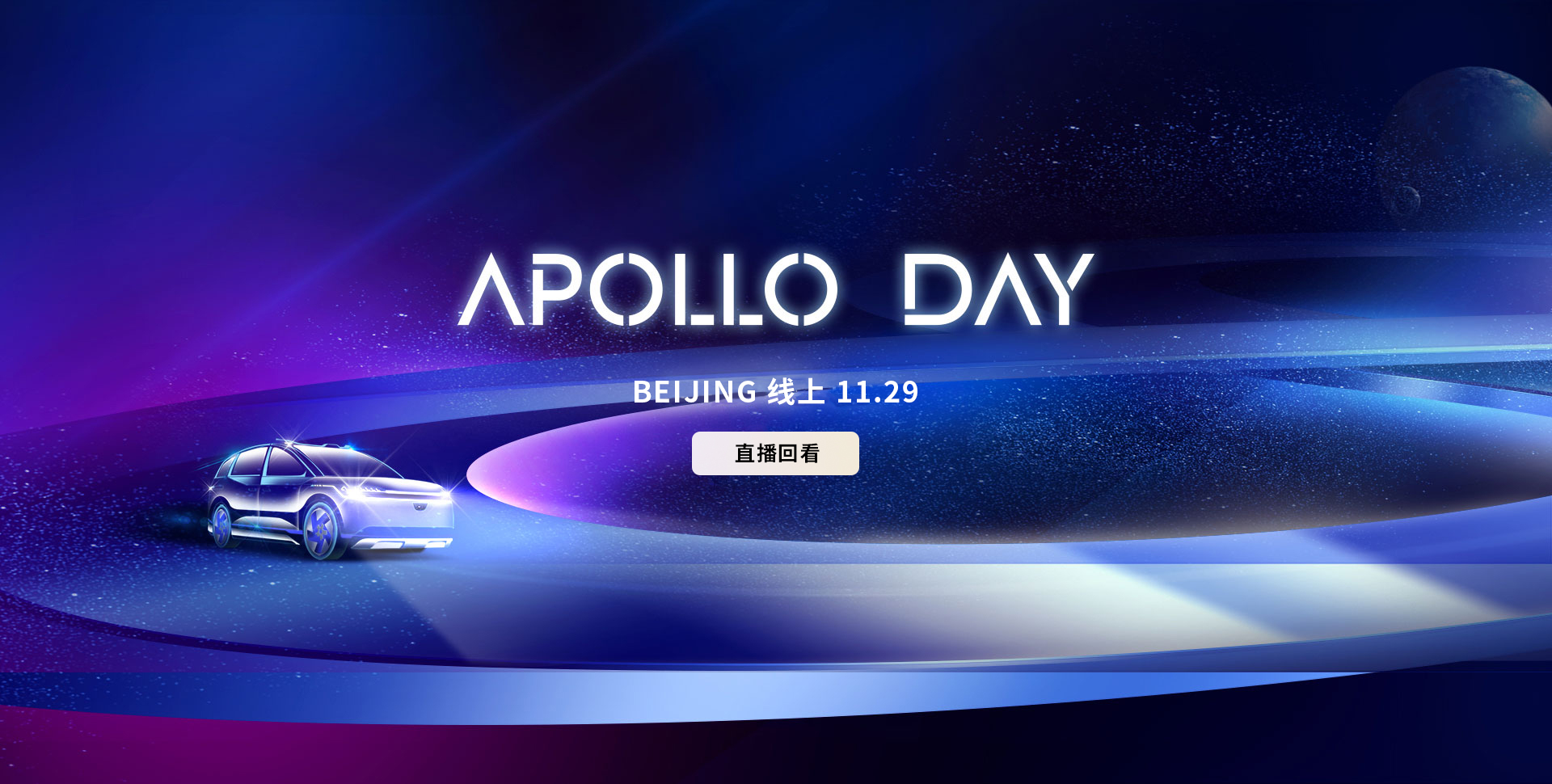November 29, 2022, /FutureCar/ - China's internet technology giant Baidu Inc. held its "Apollo Day" live-streamed technology event on Monday where the company shared its latest progress on autonomous driving. Apollo Day was streamed on Baudi's YouTube channel and is named after its open Apollo autonomous driving technology platform.
Baidu opened up the Apollo ecosystem to developers in 2017 to help speed up the deployment of autonomous driving technology through industry collaboration and progress has been rapid over the past five years.
Since its launch, the Apollo platform has come to be regarded as the "Android of the Automotive Industry." It's the largest open-source autonomous driving platform in the world, according to Baidu.
Among the announcements at Apollo Day is Baidu's plans to launch the world's largest fully-autonomous ride-hailing service aptly named "Apollo Go" by next year and become the world's biggest robotaxi operator. The Apollo Go ride-hailing vehicles will be capable of operating without human oversight and without safety drivers onboard.
However, building a safe autonomous ride-hailing service to serve customers in China's densely packed cities requires far more technology behind the scenes, such as artificial intelligence (AI), cloud computing, computer vision and processors capable of performing trillions of operations second (TOPS).
At Apollo Day, Baidu shared how it will implement these core technologies to safely carry passengers in fully-autonomous robotaxi vehicles as it makes plans to rapidly scale the service.
Baidu's recent technology breakthroughs include advances in autonomous driving perception, high-definition autonomous driving maps with centimeter-level accuracy, a closed-loop autonomous driving data system, and the successful end-to-end adaptation of powerful AI chips to power the autonomous driving technology stack.

Currently, Baidu's autonomous ride-hailing platform Apollo Go covers more than 10 cities in China including all first-tier cities such as Beijing and Shanghai. With breakthroughs in AI and other technologies used by Apollo Go, Baidi says it can now scale its robotaxi operations to new cities in as little as 20 days.
The rollout of Apollo Go has been rapid, much faster than in the U.S. where industry leaders Waymo and Cruise are offering limited driverless ride-hailing services in San Francisco.
Baidu has been operating its robotaxis on a limited scale without drivers since June in the cities of Chongqing and Wuhan. The service area covers hundreds of square kilometers. But Baidu will continue to expand its ride-hailing operation area next year to reach its goal of operating the world's largest service area for fully driverless vehicles.
To date, Apollo Go has completed more than 474,000 trips, which represents a 311% year over year, and a 65% increase since last quarter alone. By the end of Q3 2022, the accumulated rides provided to the public by Apollo Go have reached 1.4 million and that number continues to grow.
In Beijing and Shanghai, Baidu says that each robotaxi vehicle on the Apollo Go platform can provide around 15 rides a day on average, nearly the same as a typical online ride-hailing car service in China using human drivers.
"Backed by its solid AI technology, Baidu Apollo has created a safe, intelligent and efficient autonomous driving technology system, bringing robotaxi services from designated zones to open roads at scale," said Jingkai Chen, Baidu's autonomous driving technology expert at the event. "The generalization ability of Baidu's autonomous driving technology has progressed at a more advanced pace than expected."
How Baidu's Autonomous Vehicles Deal With Challenging 'Edge Cases'
In preparation to expand Apollo Go, Baidu says it created the Industry's first AI big model for autonomous driving, which helps address what's known as edge cases, where an autonomous vehicle encounters something that its software cannot deal with.
Although edge cases are rare, the software powering the vehicle must be able to deal with it. So far, dealing with edge cases has been one of the biggest challenges for developers of self-driving vehicles, which can leave a vehicle stuck without knowing what to do next.
For these rare cases, developers of autonomous driving vehicles rely on human operators who can temporarily take over an autonomous vehicle remotely to get out of a jam. This solution however, is considered just an interim step until the technology improves enough to take the human out of the loop.
According to Baidu's autonomous driving technology expert Jingdong Wang, Baidu's WenXin AI big model for autonomous driving is a pre-trained visual-language model that recognizes thousands of objects a vehicle may encounter, such as pedestrians, road signs and other vehicles. Baidu's autonomous driving perception model leverages more than 1 billion parameters, which drastically improves its autonomous driving perception capabilities.
Each Apollo Go vehicle gets smarter over time, helping to improve the scope of semantic recognition for the entire fleet.
The WenXin AI big model enables autonomous vehicles to quickly make sense of an unknown object, such as a speeding emergency vehicle or something as simple as a plastic shopping bag in the roadway that's difficult for autonomous vehicle perception systems to identify.
In addition to the advanced AI-powered perception model, Bauid's autonomous vehicles use high-definition autonomous driving maps (HD Maps) for highly accurate path planning and keeping a vehicle precisely centered in its driving lane.
Baidu has collected more than 12 million kms of road networks and data for its HD Maps, along with hundreds of millions of human driven hours.
The automatic production capability means that Baidu can create its highly accurate HD maps automatically. The automation rate of Baidu's high precision map production has now reached 96%, the company claims.
For developers of autonomous vehicles, creating HD maps is generally a painstaking process, requiring mapping vehicles equipped with cameras and lidar to collect massive amounts of data used to build HD maps. Baidu integrates these data points to improve the reliability of autonomous driving.
"Baidu's new generation autonomous driving map is equipped with comprehensive capabilities such as automatic production, real-time fusion, and knowledge enhancement." says Jizhou Huang, Baidu's autonomous driving technology expert. "It will be put into mass production to realize a safe, reliable and efficient autonomous driving experience."
Baidu's Closed-Loop Data System Helps its Robotaxi Vehicles Become Smarter
Another important part of Baidu's Apollo Go technology stack is a "closed-loop data" system that improves decision making over time. As more vehicles are added to Baidu's robotaxi fleet, these decision making capabilities improve exponentially.
Still, Baidu faced additional challenges in labeling and making sense of all the new data collected by its Apollo Go fleet. To solve this, Baidu introduced a concept it calls "Fine Purification, Strong Ingestion." It's essentially a closed-loop system dubbed "Apollo Loop" that helps with the task of identifying, labeling and utilizing data.
According to Ang Li, Baidu's technology expert, Apollo Loop leverages both on-board small AI models and cloud-based big AI data models to achieve high-efficiency data mining as well as automated labeling.
The Apollo Loop data ingestion architecture achieves automated training and understands how to effectively utilize this data to improve the intelligence of its autonomous driving system to support Level 2 through Level 4 autonomous driving.
Baidu is also leveraging its decade-long experience in autonomous driving to explore ways that L4 and L2+ autonomous driving systems can coexist. Currently, Baidu's technology stack level enables the unification of both L4 and L2+ autonomous driving capabilities, including perception technical architecture, map unification, data interconnection and infrastructure sharing.
Baidu also built its own AI-powered chip for its self-driving vehicles named the Kunlun. The company introduced the first generation of its Kunlun chips in 2020. Since then, they've been used for Baidu's self-driving vehicles and cloud computing tasks.
Baidu has since spun off its chip development unit into a separate company named Kunlun Chip.
At Apollo Day, Baudi announced that its second generation Kunlun AI chip has completed an end-to-end performance adaptation for autonomous driving. It represents a major milestone for integrating Baidu's autonomous driving software and hardware, according to Jian Ouyang, CEO of Kunlun Chip, who was the chief architect of the first generation Kunlun chip at Baidu before being named CEO of the new company.
As Baidu continuously works to scale its Apollo Go service in China, the company has also built a vehicle for the platform. In August, Baidu unveiled its Apollo RT6 robotaxi, which is the sixth generation of the vehicle. It was built from the ground up for commercial ride-hailing. It's the first vehicle built on Xinghe, which is Baidu's in-house developed automotive E/E architecture specifically designed for L4 autonomous driving.

Baidu's Apollo RT6 fully-autonomous robotaxi.
The futuristic RT6 includes a removable steering wheel to free up additional cabin space. The steering wheel-free design allows for more customization of the interior, such as adding extra seating, desktops, gaming consoles, even a small vending machine where passengers can purchase snacks or drinks. The vehicle also features intelligent electric sliding doors to further enhance the riding experience.
The Apollo RT6 is slated to join Baidu's Apollo Go ride-hailing service fleet starting in 2023. The number of vehicles on the Apollo Go platform is expected to grow to include ten of thousands of vehicles, which will bring Baidu closer to its goal of operating the world's biggest driverless ride-hailing service.
Zhenyu Li, senior corporate vice president of Baidu and general manager of its Intelligent Driving Group (IDG), said the autonomous driving capabilities of Apollo RT6 is equivalent to a skilled human driver with 20 years of experience.
About IDCNOVA
IDCNova (Website: www.idcnova.com) is registered under the Hong Kong based Digital Intelligence International Company Limited. Ditital Intelligence International aimes at establishing IDCNOVA as a professional media and consulting organization focusing on Internet data center and cloud computing industry, with proactive participation in global emerging markets.
IDCNOVA shares the parent company's unparalleled industry resources and influences in China to track the growth of the ecosystem by delivering news and professional advise on data center in China.
IDC Industry Research Report
2021-2022 China Data Center Industry Electromechanical Equipment Market Research Report
![]() 2021-2022 China Data Center Industry Electromechanical Equipment Market Research Report.pdf
2021-2022 China Data Center Industry Electromechanical Equipment Market Research Report.pdf
2020-2021 China IDC Market Research Report
![]() Sample 2020-2021 China IDC Market Research Report.pdf
Sample 2020-2021 China IDC Market Research Report.pdf
2020-2021 IDC Market Analysis Report in Beijing and Surrounding Areas
![]() Sample 2020-2021 IDC Market Research Report for Beijing and Surrounding Areas.pdf
Sample 2020-2021 IDC Market Research Report for Beijing and Surrounding Areas.pdf
2020-2021 IDC Market Analysis Report in Shanghai and Surrounding Areas
![]() Sample 2020-2021 IDC Market Research Report for Shanghai and Surrounding Areas.pdf
Sample 2020-2021 IDC Market Research Report for Shanghai and Surrounding Areas.pdf
2020-2021 IDC Market Research Report for Guangzhou-Shenzhen and Surrounding Areas
![]() 2020-2021 IDC Market Research Report for Guangzhou-Shenzhen and Surrounding Areas.pdf
2020-2021 IDC Market Research Report for Guangzhou-Shenzhen and Surrounding Areas.pdf
For industry insights, please contact [email protected]
English Website: www.idcnova.com
Wechat Account: 
Twitter: @idcnova








